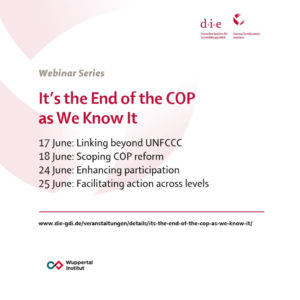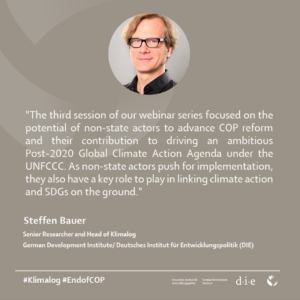
During the second half of June, the German Development Institute / Deutsches Institut für Entwicklungspolitik (DIE) hosted an Online Expert Workshop Series entitled „It’s the end of the COP as we know it!” together with the Wuppertal Institut für Klima, Umwelt, Energie. It called upon experts to consider reform options that enable the annual “Conference of the Parties” (COP) of the UN Framework Convention on Climate Change (UNFCCC) to further effective implementation of ambitious climate policy. Originally planned as a two-day workshop, the co-chairs resorted to a web format with four separate online sessions, in response to the Covid-19 pandemic.
On 17th June, the workshop kicked off with a keynote intervention by Martin Frick, Deputy of the UN Secretary-General’s Special Envoy for the Food Systems Summit 2021. He highlighted the relevance of food systems for effective climate policy as underscoring the need for a systemic approach to the global climate crisis. This effectively set the tone for the ensuing session on horizontal interlinkages in multilateral climate governance. Following presentations by Alexandra Deprez (IDDRI), Ludwig Liagre (University of Padua), Christián Retamal and Julio Cordano (Government of Chile), Susan Biniaz (Yale University) and a critical appraisal by Ina Lehmann (DIE), the virtual panel discussed the potential for aligning UNFCCC COPs with other multilateral processes, for instance, with regard to biodiversity conservation and the promise of “nature-based solutions.”
In the second session, on 18th June, Damon Jones (Climate Analytics), Stefan Aykut (University of Hamburg), Darius Nassiry (Climate Finance Advisors, BLLC), and Wolfgang Obergassel and Lukas Hermwille (Wuppertal Institute), with Dan Bodansky (Arizona State University) and Katia Simeonova (UNFCCC Secretariat) as designated discussants, endeavoured to “Scoping COP reform” by inter alia differentiating distinct roles and functions of the UNFCCC COP.

On 24th June, the third session focussed on the role of non-party stakeholders to driving institutional change and policy implementation, which proved a recurrent theme across the entire workshop series. Thomas Hale (Oxford University) and Bryce Rudyk (New York University), Carolin Fraude and Thomas Bruhn (IASS, Potsdam), Idil Boran (York University) and Sander Chan (DIE), as well as discussants Heike Schroeder (University of East Anglia) and Joanes Atela (ACTS, Nairobi) addressed this under the common theme of “Enhancing participation”.
The fourth and final session, on 25th June, turned to “Facilitating action across levels” with presentations by Shalini Sharma (ICE&SDGs, India), Frank Granshaw (GPSEN, USA), and Kathleen Mar (IASS, Potsdam) and additional commentaries by Richard Klein (SEI) and Saleemul Huq (ICCCAD). Co-chairs Steffen Bauer (DIE) and Lukas Hermwille (Wuppertal Institute) wrapped up the workshop series as they connected the dots across all four sessions in their concluding presentation. They noted an emergent consensus on the need for the COP to move from negotiation to implementation and to provide high-level political guidance to that end. This objective, the workshop series suggests, could be facilitated by embracing the potential of a broader spectrum of actors, including non-state actors, and by reaching out to multilateral processes and policy sectors that lie beyond the UNFCCC.
If you wish to join the debate on how to reform UN climate conferencing for the benefit of ambitious and effective implementation, you may refer to the hashtag #EndOfCOP on Twitter.

Schreibe einen Kommentar